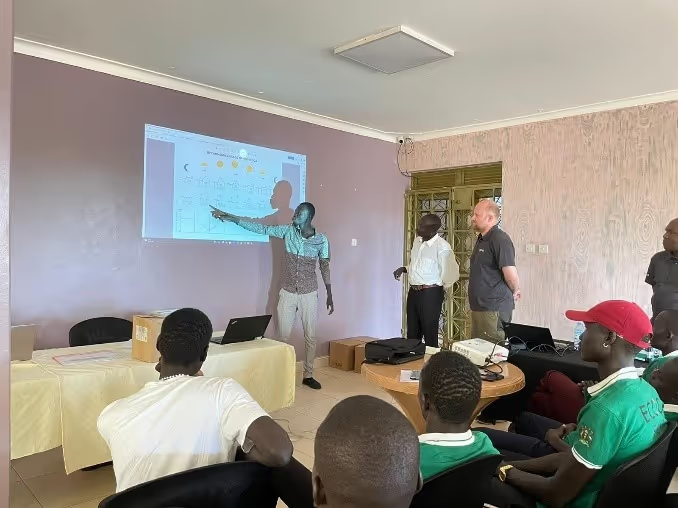Shifting the power: increasing Global South leadership within grants we fund (part two)

This blog is authored by Simon Pickard our Senior Portfolio Manager for the R2HC programme.
This is the second of a two-part series, where Simon captures R2HC’s recent experiences of adapting our processes with the aim of increasing lower-middle income countries’ leadership within the grants we fund.
Shifting the power in humanitarian research has important moral, pragmatic and ethical benefits, explored in this accompanying blog. Ensuring more funding goes to studies led by Global South organisations is an important first step. In our most recent R2HC funding calls we are hoping to fund six studies led by institutions or NGOs based in the Global South, three times as many than in previous funding rounds. Here we outline some of the practical steps we’ve taken.
A changed approach
The changes that we made fell into three main areas:
Framing of the Calls
Rather than seeking generalisable answers to global problems, these funding calls sought evidence in response to identified needs in country contexts as determined by local stakeholders. Too often the ‘literature’ is regarded as the sole or main determinant of what counts as a problem or solution, placing less importance on local knowledge and understanding. When research is undertaken in low-income countries (LIC) the research questions should be derived from research priorities from within those localities (ideas that are well-articulated in the Global Health Matters podcast).
Demonstrating contextual knowledge
Applicants were prompted to describe their team’s lived experience of the research setting in the CVs submitted alongside their publication history. We required letters of support from evidence users explaining how they planned to apply the findings, and from partners in the research consortium outlining their inputs into the proposal development expressing what they wanted to get out of their participation. We also made available tools such as our Partnership Agreement template and Partnerships and Impact checklist for applicants, to encourage equitable set-up of grants.
Assessing the proposals
We aimed to identify at least one technical reviewer from the country where research would take place; ideally someone who had worked with the relevant humanitarian stakeholders in an influencing role. These reviewers were asked to comment on the local demand and relevance of the research in the country, whether the appropriate stakeholders and research team members were engaged, and whether the contextual background was appropriately reflected in the proposal. We also split out the ‘impact’ criteria against which applications are assessed, into three component parts: justification and relevance, potential impact, and demand for the research. We increased the overall weighting for the combined impact criterion from previous rounds.
“It is a good idea to ask applicants to provide letters of support from research partners and stakeholders because it forces researchers and stakeholders to work together to prepare the proposal and to be transparent in the process. However, this is not enough. The choice of researchers from the South makes it possible to be closer to the partners because they often already know each other and have developed long-standing relationships. This facilitates collaboration and trust between researchers and stakeholders.”
(Mohamed Ali Ag Ahmed, University of Sciences, Techniques and Technologies of Bamako)
With remaining challenges
Whilst this approach helped move us forward, it left us with several questions and challenges we will need to address in future funding calls:
- How should we address issues of potential bias in contextual reviews, for example when there are political sensitivities related to particular locations or topics? These are potentially harder for our Funding Committee members, who rely on reviews to aid their decision-making when approving proposals, to spot than academic biases relating to academic discipline or methodological approach.
- Is it reasonable to expect busy humanitarian staff working for operational organisations in emergency contexts to have the time to review a research proposal?
- Is it realistic to think we can identify reviewers with the required research and operational expertise in specific settings, who are sufficiently unfamiliar with the applicants that we avoid conflicts of interest?
We also know there are many more steps we need to take. Whilst we’ve made progress in diversifying our Funding Committee and other governance groups – intentionally seeking to recruit reviewers based in, or with direct experience of, relevant Global South settings – there is more for us to do. Prompted by our work with Emilie Koum Besson, Research Fellow at London School of Hygiene and Tropical Medicine, we can do more to consider positionality (power and perspective) across the review process for issues of bias.
There's also more that we’re planning to do to ensure that all the research teams we fund take steps to ensure their study findings are made available in accessible formats, so they can be used by local stakeholders and communities where the research has been conducted. Later this year we hope to launch a short online course in ‘Community Engagement for Research Impact’ as part of our existing Research Impact toolkit.
Call to action
We hope that by sharing our experiences we can help inform others. The US National Institute for Health (NIH) recently requested inputs on approaches they might take to promote greater equity in global health research conducted in low- and middle- income countries, whilst the UK’s National Institute for Health Research and FCDO are keen to incorporate similar approaches into their own grant making. We welcome your reflections and suggestions to help us as we move further to embed a meaningful shift in power.
Stay updated
Sign up for our newsletter to receive regular updates on resources, news, and insights like this. Don’t miss out on important information that can help you stay informed and engaged.
Explore Elrha
Learn more about our mission, the organisations we support, and the resources we provide to drive research and innovation in humanitarian response.